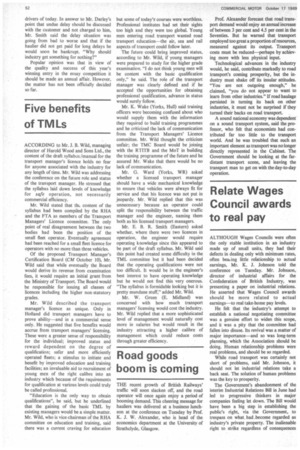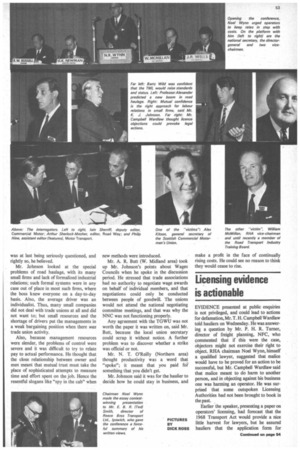Relate Wages Council awards to real pay
Page 54

Page 55

If you've noticed an error in this article please click here to report it so we can fix it.
ALTHOUGH Wages Councils were often the only stable institution in an industry made up of small units, they had their defects in dealing only with minimum rates, often beasing little relationship to actual earnings, Mr. K. J. Johnson told the conference on Tuesday. Mr. Johnson, director of industrial affairs for the Confederation of British Industry, was presenting a paper on industrial relations. He asserted that Wages Council awards should be more related to actual earnings—to real take-home pay levels.
He felt that the industry's attempt to establish a national negotiating committee was a genuine effort to widen this scope, and it was a pity that the committee had fallen into disuse. Its revival was a matter of major importance—and so was long-term planning, which the Association should be doing. Human relationship problems were real problems, and should be so regarded.
While road transport was certainly not short of problems, said Mr. Johnson, it should not let industrial relations take a back seat. The solution of human problems was the key to prosperity.
The Government's abandonment of the interim Industrial Relations Bill in June had led to progressive thinkers in major companies feeling let down. The Bill would have been a big step in establishing the public's right, via the Government, to trespass on what had ,become regarded as industry's private property. The inalienable right to strike regardless of consequences was at last being seriously questioned, and rightly so, he believed.
Mr. Johnson looked at the special problems of road haulage, with its many small firms and lack of formalized industrial relations; such formal systems were in any case out of place in most such firms, where the boss knew everyone on a day-to-day basis. Also, the average driver was an individualist Thus, many small companies did not deal with trade unions at all and did not want to; but small resources and the shortage of drivers put the managements in a weak bargaining position when there was trade union activity.
Also, because management resources were slender, the problems of control were severe and it was difficult to try to relate pay to actual performance. He thought that the close relationship between owner and men meant that mutual trust must take the place of sophisticated attempts to measure time and effort spent on the job. Hence the resentful slogans like "spy in the cab" when new methods were introduced.
Mr. A. R. Butt (W. Midland area) took up Mr. Johnson's points about Wages Councils when he spoke in the discussion period. He stressed that trade associations had no authority to negotiate wage awards on behalf of individual members, and that negotiations could only be conducted between people of goodwill. The unions would not attend the national negotiating committee meetings, and that was why the NNC was not functioning properly.
Any agreement with the TGWU was not worth the paper it was written on, said Mr. Butt, because the local union secretary could scrap it without notice. A further problem was to discover whether a strike was official or not.
Mr. N. T. O'Reilly (Northern area) thought productivity was a word that "spoke"; it meant that you paid frif something that you didn't get.
Mr_ Johnson said it was for the haulier to decide how he could stay in business, and make a profit in the face of continually rising costs. He could see no reason to think they would cease to rise.




























































































































